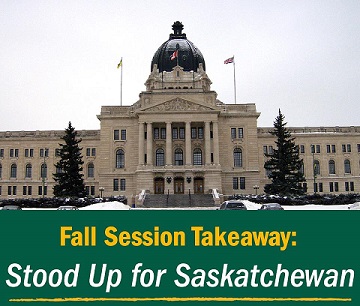Provincial Point of View
December 10, 2018
FALL LEGISLATIVE SESSION DELIVERS ON COMMITMENTS TO STAND UP FOR SASKATCHEWAN

Premier Scott Moe said the government ended the fall sitting of the legislative session by delivering on priorities for the economy and people of Saskatchewan.
“During this fall session, we outlined our commitment to balance the budget in the spring, continued the fight against the federal carbon tax and invested in the services and infrastructure necessary for the people of this province,” Moe said. “Over the past seven weeks, our government became a leader in the country through legislation to expand Workers’ Compensation coverage for firefighters, create the longest maternity leave in the nation and become the first province in Canada to introduce Clare’s Law to help those at risk of intimate partner violence.”
As the threat of a federal carbon tax continues to face Saskatchewan, the Government of Saskatchewan is implementing Prairie Resilience, the made-in-Saskatchewan climate change plan supported by industry. This includes legislation introduced this fall to establish intensity-based performance standards for large emitters as well as the new Climate Resilience Measurement Framework, the first of its kind in Canada, with 25 different measures to monitor and enhance Saskatchewan’s resilience to climate change.
“Even as our province continues to face trade, transportation and economic challenges, this session we saw a year-over-year employment increase of 9,400 jobs – the largest job gains since 2014,” Moe said. “We will continue to stand up for our province locally, national and internationally to continue this job growth and fight the Trudeau carbon tax, which will kill jobs and make our industries less competitive.”
Safety was also a focus of the fall session with the introduction of mandatory minimum training requirements of 121.5 hours for commercial semi drivers, a proposed enhancement to rural policing to allow municipalities with populations under 500 to join regional police services and amendments to trespassing legislation which will afford rural land owners the same requirements for land access as urban land owners.
To help Saskatchewan people who may need time off from work to care for family members, changes to The Saskatchewan Employment Act will create a new critically ill adult leave, expand parental leave and add an additional week of maternity leave. More people who face health challenges because of their jobs will be covered through changes to The Workers’ Compensation Act, making Saskatchewan a leader in the country for the number of occupational diseases firefighters will have presumptive coverage for.
Saskatchewan announced plans to be the first province in Canada with Clare’s Law, legislation to provide police services with a framework to disclose information about someone’s violent past to intimate partners who may be at risk. Interpersonal violence leave will also be expanded to include sexual violence of any kind, allowing Saskatchewan residents to take time off to seek medical attention or access supports.
This session, the government announced a commitment to apologize to those in our province affected by the Sixties Scoop. Sharing Circles, led by the Sixties Scoop Indigenous Society of Saskatchewan, took place across the province to help inform the apology.
Infrastructure investments continued with Saskatchewan Hospital North Battleford nearing completion, the Jim Pattison Children’s Hospital reaching 92 per cent completion, working on rural cellular service with another 50 communities to see better coverage by the spring and the opening of new bridges, passing lanes and intersection improvements across the province.
Bilateral agreements were signed with the federal government this fall to provide nearly $900 million for infrastructure projects over the next decade and more than $5 million to improve access to treatment for people with opioid or crystal meth dependencies.
The next sitting of the Legislative Assembly is scheduled to begin March 4, 2019.
